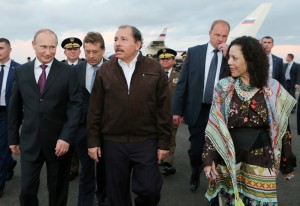UNITED NATIONS — It’s been a momentous week for Russian President Vladimir Putin. While the major media focused on his trip to Brazil to accept the handover for the next FIFA World Cup football tournament in Russia as well as his participation in the Summit of the BRIC economic powers, the real story was the largely-overlooked wraparound of his Latin American charm offensive. Here’s the background.
Cuba
Before flying to Brazil for the football final match and the FIFA handover for the 2018 World Cup, Putin first stopped in Cuba to renew the spark of the old Cold War alliance between Castro’s communists and the Soviet Union. While Russia’s political system has witnessed significant change since 1991 following the formal collapse of the Soviet Union, Cuba remains in a kind of tropical torpor time warp. The Castro brothers still run the island but the revolutionary zeal is long gone replaced by debt, corruption, and poverty.

When Vladimir Putin met with both the current ruler Raul Castro and the retired “comandante” Fidel, he brought a pragmatism back to the once comradely Cuban/Russian relationship. Energy-rich Russia has forgiven $30 billion in Cuban debt; an extraordinary 90 percent sum for the dead broke Caribbean island. Realistically Russia knew the debt would never be repaid, so why not write it off, but for a price?
While in Cuba, Putin scored some significant under-the-radar gains. New ground facilities for the Russian GLONASS satellite navigational system, (sounds very James Bond) which will in theory compete with coverage for American GPS satellites. More importantly, the Russians are revamping the Lourdes electronic listening center outside Havana. During Cold War times, the Lourdes facility hosted 3,000 Russians involved in massive electronic eves dropping on the USA. It closed in 2001.
Given its relative proximity, Lourdes can serve as an electronic vacuum for intelligence gathering from the southern USA a mere 155 miles away.
Nicaragua
After his Cuban visit, Putin’s party made an unexpected diversion to Managua, Nicaragua. The surprise stop, the first ever by a Russian president, was apparently the idea of Russian Foreign Minister Sergei Lavrov. While former comradely ties between the ruling Sandinistas (they’re back in power too) and the Soviets were close, the relationship has lapsed. This was a good time to catch up. President Daniel Ortega (remember him?) called Putin’s visit “A Ray of Light!
Why Nicaragua? There’s renewed interest in building a new cross Central American canal to compete with the American built canal in Panama. While Russia is not in on the plans per se, a mysterious Chinese company HKND has announced plans for a $50 billion project starting later this year. Historically while all these new canal stories need more than a grain of good Caribbean sea salt, there’s little doubt that Moscow looks towards Nicaragua as a reliable regional foothold.
Nicaragua after all, has supported Moscow’s actions in Ukraine and let’s not forget in Georgia during the 2008 conflict as well. The leftwing Managua government is one of a few countries who diplomatically recognize two separatist rump-regimes set up by Russia after the Georgia war.
Argentina
Then on to Argentina literally on the eve of the country’s World Cup showdown!
Putin exclaimed, “today, Argentina is one of Russia’s key strategic partners in Latin America, the UN and the G20. Our approaches to the key issues in global politics are either similar or identical.” Indeed President Christina Kirchner’s government has been supportive of Russia’s controversial moves in Crimea earlier this year.
Important nuclear deals were signed with Russia’s atomic energy corporation Rosatom to become involved in the construction of Argentina’s Atucha 3 nuclear power plant. Significantly on the political front, Putin roiled the South Atlantic waters by offering diplomatic support for the Argentine government’s campaign to open direct negotiations with Britain over the future of the disputed Falkland islands/Malvinas.
According to the Moscow Times, Argentina will allow the state-owned international news channel RT (Russia Today) to broadcast its Spanish language service alongside local TV channels.
Brazil
At the high profile BRIC summit (Brazil, Russia, India, China) of the world’s largest emerging markets, members pressed ahead with creation of a $150 billion bank and reserve fund. The BRICS’s have tried to balance their global economic clout with growing political power. Putin stated, “Thanks to Russia’s and China’s firm stance in the UN Security Council, supported by other BRIC’s members, we have managed to prevent an international invasion in Syria.”
Putin is filling a power vacuum created by Washington’s perceived weakness and yawning political ambivalence towards Latin America.
John J. Metzler is a U.N. correspondent covering diplomatic and defense issues. He writes weekly for WorldTribune.com. He is the author of Transatlantic Divide ; USA/Euroland Rift (University Press, 2010)


You must be logged in to post a comment Login